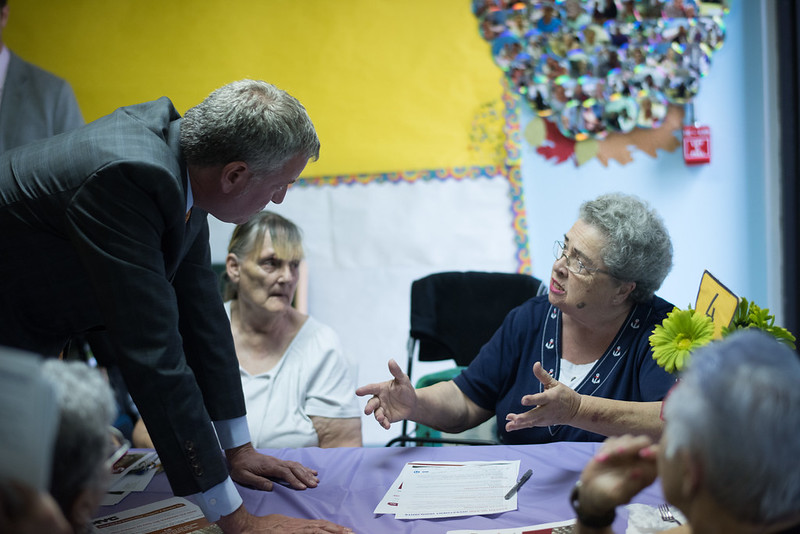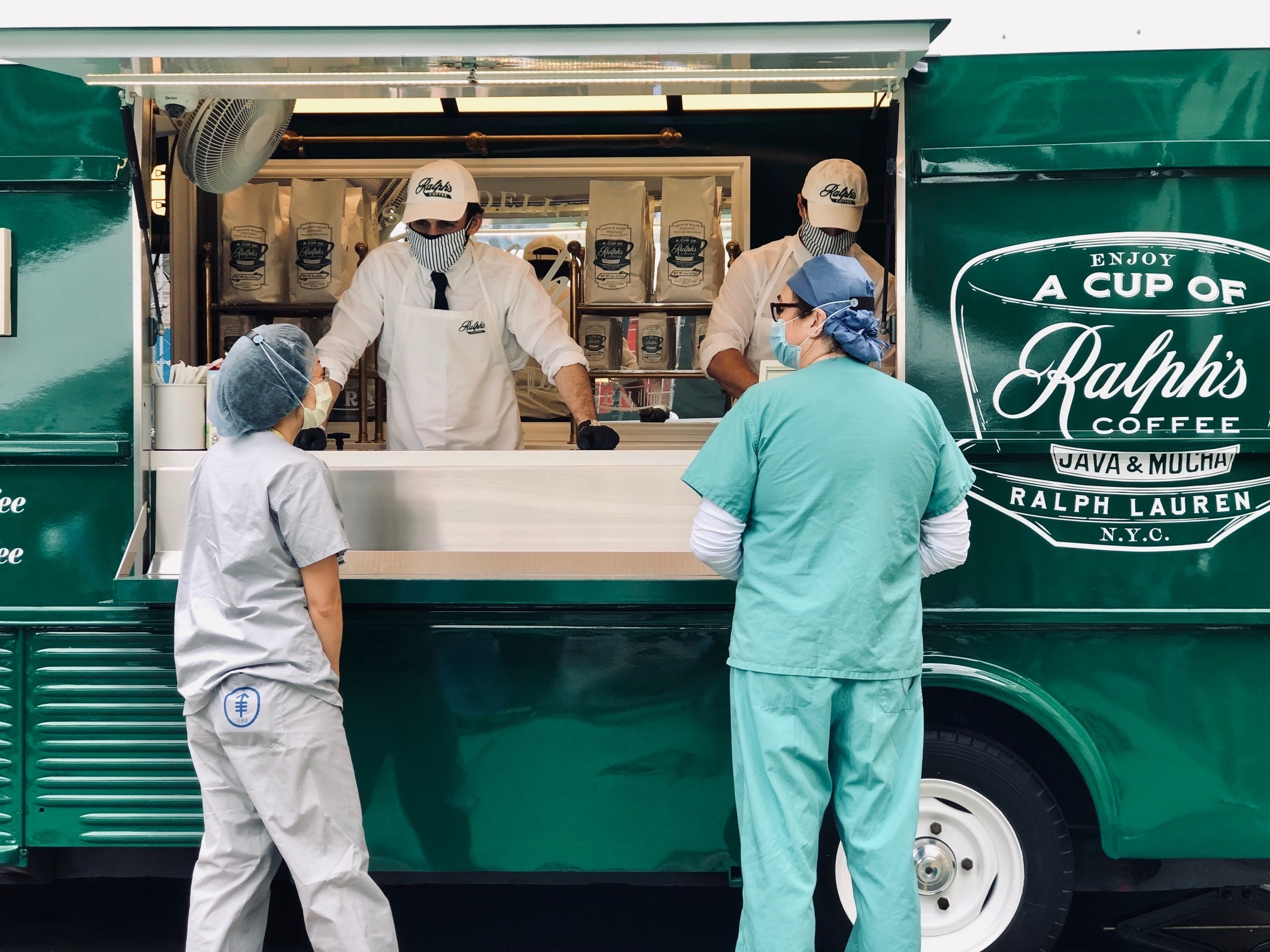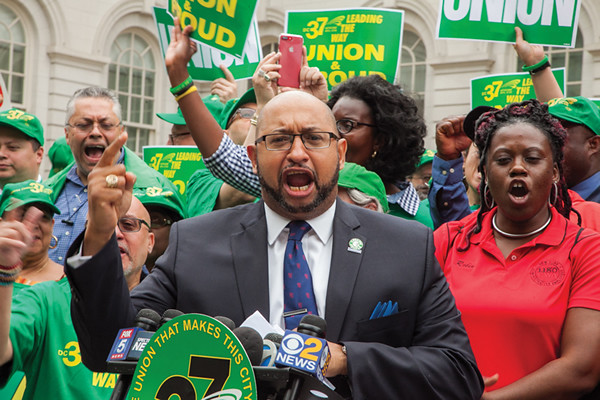How to Get the City’s 136,000 Homebound Seniors Vaccinated More Quickly

Mayor de Blasio at a senior center (photo: Michael Appleton/Mayoral Photography Office)
Vaccines are the lifeline that will get us out of this crisis. But since vaccine distribution haltingly began two months ago, New York City’s estimated 136,000 homebound seniors had been left isolated with the knowledge that while they are the most at-risk of dying from COVID-19 (eight out of 10 covid deaths nationwide have been over age 65), they have no way to obtain a lifesaving vaccine.
Their more mobile friends and neighbors — first those over age 75, then over 65, and now over 60 — can visit a vaccine site and get inoculated (assuming, of course, they are able to navigate a truly convoluted online appointment system), while many of the homebound can only watch vaccinations on TV, even as they worry that the health aides they rely on may bring covid into their homes.
The city has now announced its program to vaccinate homebound seniors with the new Johnson & Johnson one-shot vaccine, launching in Co-op City and Brighton Beach. But there’s real concern that those good intentions haven’t resulted in a real plan beyond pop-ups, and could lead to a replay of the senior food distribution debacle during last spring’s shutdown.
Back then, the city’s senior centers — themselves a lifeline serving daily meals to tens of thousands of seniors — were left in the dark as the city closed their doors and programs had to improvise to provide home-delivered meals to thousands of newly-isolated older New Yorkers. The city’s Department for the Aging didn’t have the capacity to handle the list-making, meal-sourcing, and delivery logistics for thousands of households, but that work is already done at the community level by senior centers, meal centers, and case management agencies. The mayor had to appoint a food czar to straighten out the problems in getting life-sustaining daily nutrition to those who needed it.
The city’s vaccine honchos should learn from that experience. They should recognize that the mayoral administration can’t go it alone — and doesn’t need to.
The city can and should start with the 20,000 homebound seniors enrolled in the Department for the Aging’s Home Delivered Meals program executed by 23 community-based organizations, and leverage their logistics experience, infrastructure (refrigerated trucks!), and trusted relationships to make appointments for seniors and collect crucial advance information for the vaccinator — medical conditions (including possible dementia), language assistance, and the presence of a home health aide who might also want a vaccine. It’s one thing to have a city-paid stranger or an automated system call a 75-year-old homebound elder -- and quite another for a staffer from a senior center reaching out to her. Staff at these community-based organizations can do the hand-holding because they already know how.
And the city can enlist hundreds of staff at senior centers, naturally occurring retirement communities, settlement houses, and organizations like Citymeals on Wheels and DOROT (that sponsor programs to help reduce seniors’ isolation).
Yet so far, nothing seems to have been planned with any of the obvious and logical senior-facing service delivery operations.
That’s got to change if we’re going to get every homebound senior vaccinated quickly and efficiently — and in a way that doesn't create new problems. We’re ready to help.
***
Gale A. Brewer is Manhattan Borough President and Beth Shapiro is Executive Director of Citymeals on Wheels.
***
Have an op-ed idea or submission for Gotham Gazette? Email This email address is being protected from spambots. You need JavaScript enabled to view it.
As New York Reforms Vendor Permits, Food Trucks Deserve A Seat at the Table

Food truck (photo: New York Food Truck Association)
We love to take a bite out of the Big Apple, literally speaking. New York City’s colorful culinary scene offers some of the best food from around the world, whether at a restaurant, food cart, or one of the many food trucks offering everything from scrumptious lobster rolls to Korean style BBQ. With newly-passed legislation -- the Street Vendor Bill, Intro. 1116 -- there will finally be more than 4,000 new food vendor licenses over 10 years across the boroughs, and the real work of reforming a broken system and curbing an underground market of food vendor licenses is beginning.
But the biggest question remaining is who exactly will deliver that reform.
The legislation the City Council passed establishes the formation of a Street Vendor Advisory Board to help set up and deliver a framework of how the licenses will be allocated, with members of the board including representatives from city government, the business community, and the street vendor community. Four of the 15 spots are reserved for members of the street vendor community.
As a former food truck operator, I know firsthand the challenges vendors face in trying to successfully run their businesses. My first job after graduating college was selling Belgian-style French Fries with gourmet dipping sauces from my truck, The Frying Dutchmen. The hours were long and the parking tickets added up, but the satisfied looks on New Yorkers’ faces was priceless. I quickly learned that food trucks themselves offered an amazing opportunity to bring this diverse and striving community together. It’s what inspired me to form the New York Food Truck Association (NYFTA), with the mission to promote and grow our food truck community through strategic partnerships and events.
And this is one of several reasons why one of the four spots for vendors on the Street Vendor Advisory Board should be a representative of the food truck community. Our other reasons include:
We, too, are feeling the pain. Like our friends in the food cart and brick and mortar communities, food trucks are feeling the economic strains of the pandemic. A good number of food trucks typically set up shop in front of office buildings that have largely been empty for almost a year now and it’ll be some time before those buildings are back to pre-pandemic occupancy rates. Food trucks should also be part of the recovery conversation.
Food trucks generate thousands of jobs and provide valuable tax revenue to the city. Our 75 members, which represent over 100 food trucks, generate about $15 to $20 million in taxable revenue for the city’s coffers. And a majority of food trucks, including all our members, play by the rules.
There is precedent for city support of food trucks. When Hurricane Sandy devastated our shores, the Mayor’s Fund to Advance New York City provided $1.8 million in contracts to provide much needed meals to hungry New Yorkers without power and those who lost their homes.
It’s about equity. A majority of the chatter has been around food carts, but food trucks are also included in the cap increase and are embedded in the very fabric of what makes New York City great. A lot of focus has been on allocating space for restaurants and storefronts through Open Restaurants, Open Streets, and Open Storefronts. If we truly want equity, the food truck community should legally be afforded these same opportunities as well, both on the Advisory Board and through these programs.
We can mobilize quickly during emergencies. This includes at the height of the pandemic when we donated more than 275,000 meals through our Frontline Food Trucks initiative to feed essential workers. We also partnered with World Central Kitchen and Bloomberg Philanthropies to sponsor several food trucks, delivering free food to the frontlines.
Eating safely during a pandemic. Our food trucks primarily cater to New Yorkers who are hungry for safe, social interactions including outdoor dining. Food trucks have the logistical capability to support socially-distanced outdoor events as more people get vaccinated.
Survey the needs. We are happy to hear that the New York City Department of Transportation is currently conducting a survey about food truck zones. It’s important to get this right and create a fair and equitable opportunity for food trucks to sell their food without having to arrive at 3 a.m. to secure a prime spot. We can also service neighborhoods with parking capacity and that are food deserts in their own right.
New Yorkers are hungry for opportunity. It’s something many of us have been craving the last year. As the city begins to come back to life, food trucks offer tremendous value in opportunity, resiliency, and accessibility to gourmet food at reasonable prices. Members of this new board who will help dictate street vendor reform should hear the challenges our vendors and their staff face on a daily basis. This includes one driver, Dom Tesoriero, the owner of The Mac Truck and an NYFTA member. For him, “New York City is the best place in the world to be, but also one of the most challenging environments to operate. Something has to be done to help us recover after this pandemic or our industry will be in big trouble.”
To deliver true vendor reform, everyone must have a seat at the table, including food trucks.
***
Ben Goldberg is President and Founder of the New York Food Truck Association. On twitter @NYFTA1.
***
Have an op-ed idea or submission for Gotham Gazette? Email This email address is being protected from spambots. You need JavaScript enabled to view it.
The Next Mayor Our City Needs

Henry Garrido, the author (photo: District Council 37)
[Update: two days after this op-ed column first published, CD37 announces its support of Eric Adams for mayor]
On January 1, a new Mayor will take on what is — even under normal circumstances — one of the most important and challenging elected offices in our nation. New York City’s next executive leader will inherit a city ravaged by the coronavirus pandemic and resulting citywide shutdown. The events of the last year devastated our communities, shuttered businesses, and took tens of thousands of lives. Whoever takes the city’s top job next must have the strength to confront this historical crisis and be decisive in action.
District Council 37 is New York City’s largest public sector union. We represent 150,000 city workers and 50,000 retirees. We’re the people helping your kids cross the street to school safely; we’re the paramedics who race around this city night and day transporting New Yorkers to care; we’re the ones working in your libraries and planting trees and flowers in your parks. Recently, we’re among those who you refer to as “essential.”
During this pandemic, our members suffered greatly. Some paid the ultimate price, doing their duty as essential workers, while thousands more were struck by COVID-19 yet thankfully recovered, although some with lingering effects. Even still, throughout this pandemic our members remained steadfast in providing services to the public. As we approach one of the biggest decisions we’ll make as an organization this year – which candidate to support for Mayor – we do so with the commitment and sacrifice of our members in mind.
The challenges our next Mayor will face are vast: closing a huge budget deficit, working with state and federal leaders on proper funding for our frontline workers and institutions, reaching out to the communities hardest hit by the pandemic, and daring to go beyond slogans and gestures by addressing the social and economic inequalities that plague our city. Ultimately, the person we elect to lead us must maintain the vision and strength necessary to push responsible public policy in a bold, new, direction.
Taking a new direction is often difficult — and it will be here — but this city demands a leader who has a firm grasp of the issues that will shape our future. We seek a mayor with the foresight to look beyond recovery and move New York City forward.
Strong leadership is required to improve and expand the city’s infrastructure, in making green initiatives a permanent priority, by taking up the fight to shore up our social safety net through ensuring equal access to the city’s social services to all New Yorkers, and to develop long-term reforms with non-negotiable goals for how our children are educated from preschool to our city university system.
We want a Mayor who isn’t afraid to fight and has the courage to not back down under pressure. A leader unafraid to stick by their principles is one who inspires.
The next Mayor must be someone who understands the needs of those who suffered and sacrificed the most during the pandemic, someone who respects and values their hard work, their heritage and civic culture. Our next Mayor must be someone who follows words with action in decisions regarding future budgets, contracts, and enforcement.
When it comes to the city budget, our view is simple: A budget is a statement of principles. If you value essential workers and services, you will make sure they are funded and provided for.
Tens of thousands of frontline workers have spent the last year staring down the fear of being laid off. Only after weeks of tough negotiations were unions able to hammer out an agreement that held off – at least for now -- 22,000 layoffs of essential city workers. But the threat still looms.
An austerity budget is not the answer and our next Mayor must commit to find another way. Next year, we expect a Mayor who backs up this year’s campaign promises of valuing the people who make this city run and understands that investing in city services is critical to New York City’s recovery.
Our city survived thanks to essential workers in our public institutions, our first responders and workers in municipal hospitals tending to the sick, and school workers providing hundreds of thousands of meals to children and the elderly even though schools were closed. Public library workers went to great lengths to provide services. Parks workers and highway maintainers kept working. Workers in social services, 911 and 311 operators remained on the job in dangerous work conditions giving vital services to people in need.
The Mayor our union shall support will be someone who understands that if you value these institutions you first must also respect and value the workers who allow them to function, and not set them up to be the scapegoat for every budget crisis.
The city’s public workers did their jobs, even under the most exhausting and stressful conditions. We certainly expect the same from the candidate we choose to be our next Mayor.
***
Henry Garrido is Executive Director District Council 37. On Twitter @DistCouncil37.
***
Have an op-ed idea or submission for Gotham Gazette? Email This email address is being protected from spambots. You need JavaScript enabled to view it.




